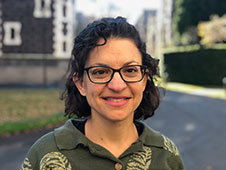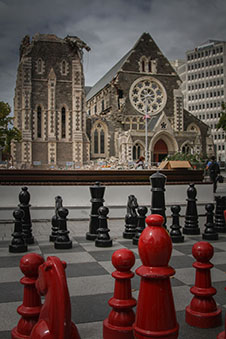 Tuesday 5 June 2018 11:18am
Tuesday 5 June 2018 11:18am
Keren Segal
In the first experimental test of the potential of natural disasters to produce stronger bonds within a group, University of Otago researchers asked residents of Christchurch, New Zealand, to recall their experience of the city's devastating 2011 (Feb 22) earthquake.
The quantitative study out of Otago's Department of Psychology involved 200 participants from Christchurch who were over 18 years old at the time of the earthquake and were in the city during the event.
Lead author, PhD Candidate Keren Segal, says various levels of "identity-fusion" - or connection with a group - can occur when people go through a shared life-defining experience. Findings from the study show a link between people's experience during the earthquake and their levels of fusion to Christchurch.

Photo: Jared Hunter Mason
"We found that participants who we asked to recall the (Feb 22, 2011) earthquake felt stronger connection to Christchurch when they endured more negative effects; when they felt more fear as they recalled the earthquake or if they suffered more harm - be that physical or psychological harm - due to the earthquake," Ms Segal says.
Levels of harm were measured by participants' responses to questions about the earthquake's effect on their own personal situation, be that their physical state, mental state, or effects on property and their workplace.
"What we found that was particularly influential and more influential than other measurements was people's emotional and physical suffering that they endured due to the earthquake - so people who suffered more physically and psychologically felt more fused and connected to the city when they recalled the earthquake," Ms Segal says.
Ms Segal adds that one of the most interesting findings was around a question asking if people felt God was involved in the earthquake or if the earthquake happened for a reason.
"We found that people who attributed more agency or more intention to the earthquake were more fused to Christchurch, so they felt a stronger connections to the city. This is important for us because usually these kind of studies are conducted when you relate to an out-group threat like a terrorist attack or war. In those situations people tend to fuse because they can say 'somebody else did it', so it was interesting to find that intention - even if it is a supernatural one - influenced how strongly people would feel towards the city."
 Photo: Jared Hunter Mason
Photo: Jared Hunter Mason
Supervising Professor Jamin Halberstadt says this is the first study to show, experimentally, that negative events need not be caused by other people to create a sense of attachment to a community.
"Natural disasters, with no human cause, also fuse those affected by them, although the effect seems to be bigger when the disaster is attributed some kind of meaning. Understanding the fusing effects of events is important because fusion is a strong predictor of people's willingness to make personal sacrifices for the good of the group - something that is especially helpful when a community is rebuilding from a tragedy" Professor Halberstadt says.
The study has been published recently in the Taylor and Francis Online Journal Self and Identity: https://www.tandfonline.com/doi/full/10.1080/15298868.2018.1458645
A video featuring Keren Segal can be viewed via on YouTube: https://www.youtube.com/watch?v=_NlLkxfR02Y
Media are welcome to use the video, and attached still images. Please credit photographer Jared Hunter Mason in any still image use aside from the head-shot of Ms Segal.
For further information, please contact
Keren Segal
Psychology PhD candidate
University of Otago
Mob 020 403 26976
Email kerense@gmail.com
Mark Hathaway
Senior Communications Adviser
University of Otago
Mob 021 279 5016
Email mark.hathaway@otago.ac.nz
A list of Otago experts available for media comment is available elsewhere on this website.
Electronic addresses (including email accounts, instant messaging services, or telephone accounts) published on this page are for the sole purpose of contact with the individuals concerned, in their capacity as officers, employees or students of the University of Otago, or their respective organisation. Publication of any such electronic address is not to be taken as consent to receive unsolicited commercial electronic messages by the address holder.
